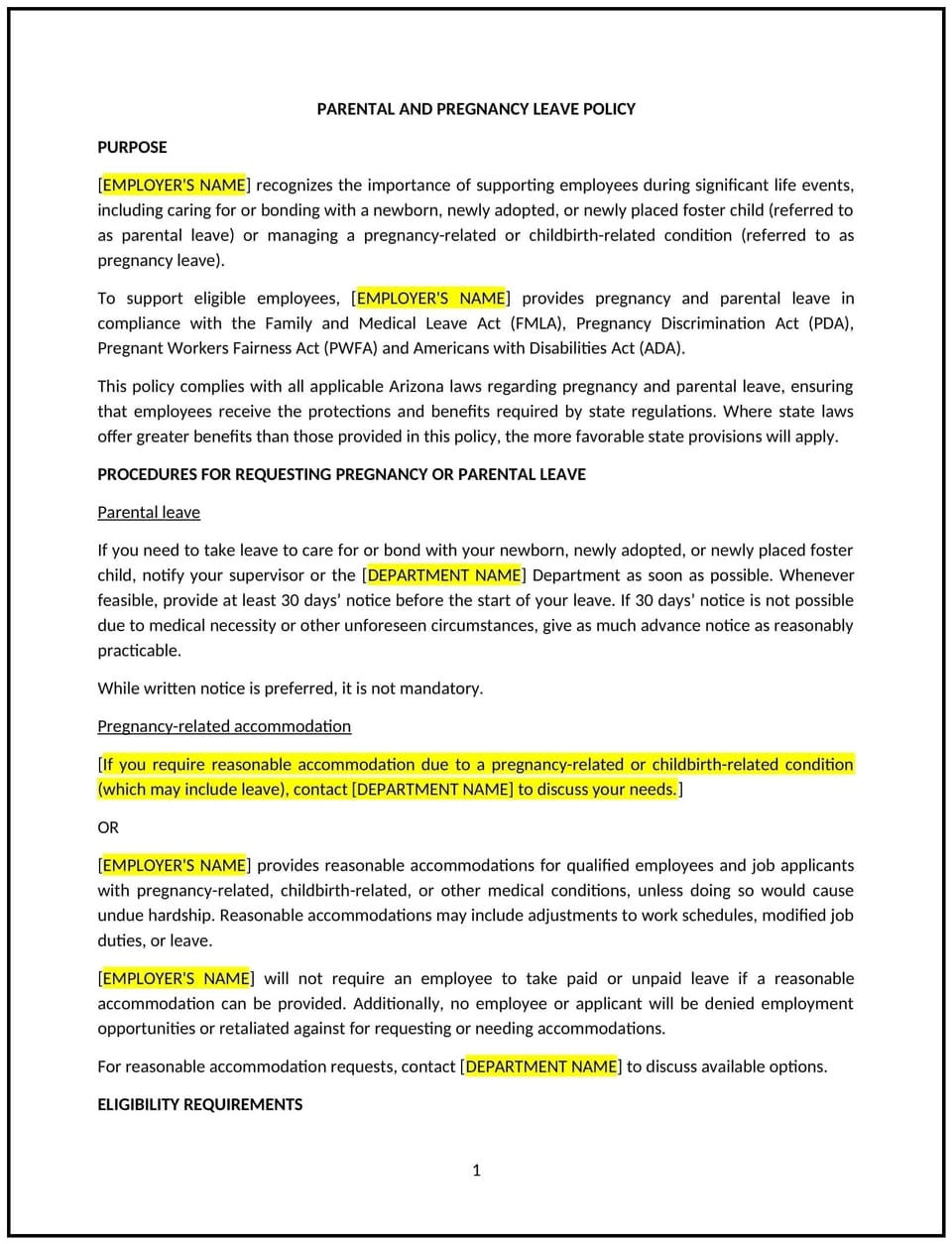Parental and pregnancy leave policy (Arizona): Free template

Parental and pregnancy leave policy (Arizona)
In Arizona, a parental and pregnancy leave policy provides employees with guidelines for taking time off related to childbirth, adoption, or pregnancy-related health needs. While Arizona does not have state-specific parental leave laws, businesses must comply with the federal Family and Medical Leave Act (FMLA) and may offer additional benefits to support employees.
This policy outlines eligibility, leave duration, and procedures for requesting and managing leave. By implementing this policy, Arizona businesses can promote employee well-being and ensure compliance with federal requirements.
How to use this parental and pregnancy leave policy (Arizona)
- Define eligibility: Specify that employees must meet FMLA requirements, including 12 months of service and 1,250 hours worked in the past year, to qualify for leave.
- Outline covered leave: Include time off for childbirth, adoption, and pregnancy-related medical conditions under the scope of the policy.
- Detail leave duration: Clarify that eligible employees may take up to 12 weeks of unpaid leave under the FMLA within a 12-month period.
- Provide request procedures: Require employees to submit leave requests with appropriate notice and documentation, such as medical certifications or adoption paperwork.
- Address benefits continuation: Specify how health insurance and other benefits will be managed during the leave period.
Benefits of using a parental and pregnancy leave policy (Arizona)
This policy offers several advantages for Arizona businesses:
- Supports compliance: Aligns with FMLA and other applicable regulations, ensuring legal protection for employees and the company.
- Enhances employee well-being: Provides employees with the security to address family and medical needs without fear of job loss.
- Promotes inclusivity: Encourages a family-friendly workplace culture that supports all employees.
- Reduces confusion: Establishes clear guidelines for leave requests, ensuring consistency and fairness.
- Protects workplace continuity: Helps businesses plan for temporary coverage during employee absences.
Tips for using a parental and pregnancy leave policy (Arizona)
- Address Arizona-specific considerations: While there are no state-mandated parental leave laws, businesses can offer additional leave or benefits to attract and retain employees.
- Communicate clearly: Ensure employees understand their rights and responsibilities under the FMLA and this policy.
- Train managers: Provide supervisors with training on handling leave requests respectfully and in compliance with federal laws.
- Use tracking tools: Implement systems to monitor leave usage and ensure compliance with FMLA guidelines.
- Review regularly: Update the policy to reflect changes in federal regulations or business practices.
Q: Who is eligible for parental and pregnancy leave under this policy?
A: Employees who have worked for at least 12 months and completed 1,250 hours of service in the past year are eligible under the FMLA.
Q: What types of leave are covered under this policy?
A: Covered leave includes time off for childbirth, adoption, and pregnancy-related medical conditions, as well as bonding with a new child.
Q: Is parental and pregnancy leave paid?
A: FMLA leave is typically unpaid; however, businesses may allow employees to use accrued paid leave, such as vacation or sick time, during the leave period.
Q: How are benefits managed during the leave?
A: Health insurance benefits must continue during FMLA leave, with employees required to maintain their portion of premium payments.
Q: How does this policy support compliance with Arizona and federal laws?
A: The policy adheres to FMLA requirements and supports employees’ rights to job-protected leave while ensuring the business meets legal standards.
This article contains general legal information and does not contain legal advice. Cobrief is not a law firm or a substitute for an attorney or law firm. The law is complex and changes often. For legal advice, please ask a lawyer.


